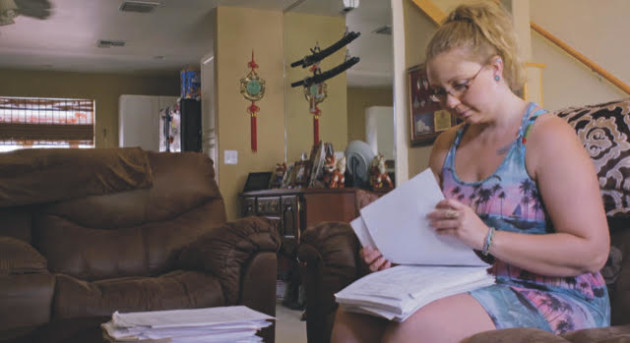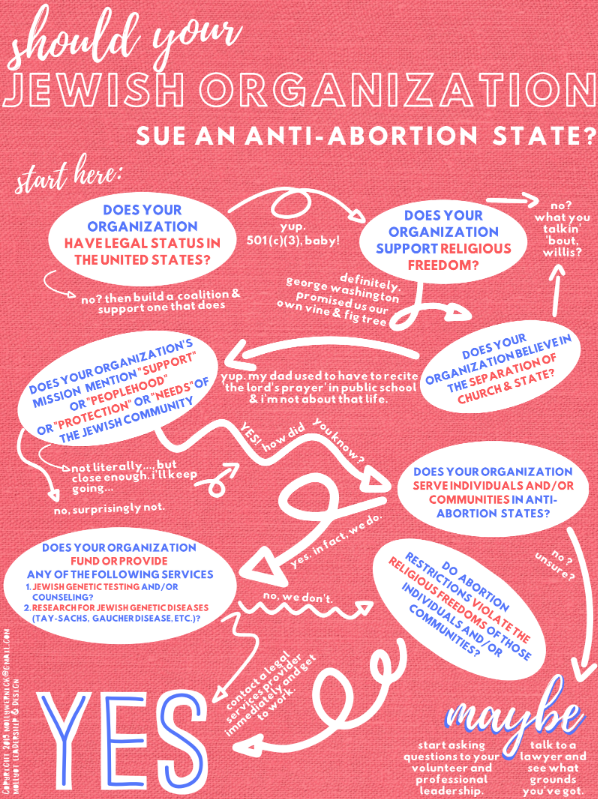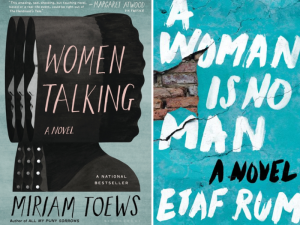Author Archives: Chanel Dubofsky
October 15, 2020 by Chanel Dubofsky
Connecting Jewish Tradition with Black Fugitive Legacies
This autumn, the parking lot of the Halcyon Arts Lab in Washington DC hosted a special sukkah built by visual artist Jessica Valoris. Though its materials—recycled cardboard, paper, bamboo and plant materials—are all things you might expect to find in your average sukkah. this one is anything but; it’s a structure that confronts the past and present, invites us to engage with possibilities of the future. Lilith spoke with Valoris about creating, Black fugitivity, spirituality, and more.





- No Comments
April 27, 2020 by Chanel Dubofsky
Abortion Under Threat: What You Need to Know
While many of us are at home, anti-choice politicians and their supporters are exploiting the anxiety around COVID-19 by attacking access to abortion rights. (Here’s a great graphic from NARAL Iowa depicting the intersection between the politicians who tried to ban abortion in 2019 and those trying to do so now.)
- No Comments
April 14, 2020 by Chanel Dubofsky
A Novel About Women, Science, Ambition— and Love
A wish for readers in 2020: May we finally and fearlessly engage with the persistent and insidious trope of the “unlikeable” female character. You might recognize these women – they have complicated desires and emotions and sometimes they make decisions that make the reader gasp and gnash her teeth and are desperate to find out what happens, and why. In other words, “unlikeable” female characters should probably just be called “characters.
- No Comments
March 5, 2020 by Chanel Dubofsky
What Happened at the Supreme Court Yesterday?
“Looming” is an appropriate word to describe the atmosphere around the current abortion rights case before the Supreme Court. On March 4th, oral arguments were heard in June Medical Services V. Russo, while outside the court, pro-choice activists, along with anti-abortion protesters, rallied.
While a decision won’t come from the court until this summer, here’s what you should know right now about the case and its implications for abortion access.
What is June Medical v. Russo?
This case is a challenge to a Louisiana law (Louisian Act 620, or Louisiana Unsafe Abortion Protection Act), enacted in June 2014, which requires abortion providers to have admitting privileges to a hospital within 30 miles of where the abortion is performed. June Medical is identical to Whole Woman’s Health v. Hellerstedt, struck down in Texas in 2016, declaring that requiring admitting privileges placed an “undue burden” on those seeking abortion care. In September 2018, the Fifth Circuit Court of Appeals revisited the 2016 decision and declared that, unlike in Texas, Louisiana actually needs the admitting privileges law to be in place in order to ensure the health and well-being of pregnant people. The question before the Supreme Court is whether or not Louisiana can enact Act 620, or if the law violates the right to abortion access.
- No Comments
March 3, 2020 by Chanel Dubofsky
When a Fetus Gets Legal Rights, Guess Who Suffers?
At the center of the new documentary film Personhood is Tammy Loetscher, a Wisconsin woman who, after losing her health insurance, experienced debilitating depression from a thyroid condition. Without access to prescription drugs, Tammy turned to self-medicating with meth, which she stopped after learning she was pregnant. After she reached out to her doctor for help, the result was Draconian in ways that, unfortunately, you can imagine. (Spoiler alert: A lawyer was appointed for Tammy’s fetus, and not for Tammy.)
Let’s start here: reproductive justice is the right to have children or not have them, and to raise the children you have in a safe environment. Reproductive justice, a framework founded by Black women, goes beyond notions of “choice” and “rights” to remind us that without access to reproductive health services, such as prenatal care, abortion and contraception, these services and the laws that make them available may as well not exist. Keep this definition in mind when you’re watching Personhood, the documentary film about what happens when a fertilized egg is given the same rights as—sometimes even more rights than–a fully formed human being, making the person carrying that egg vulnerable to a barrage of laws which take any opportunity to punish her. 
- No Comments
November 14, 2019 by Chanel Dubofsky
The Controversial Centerpiece of the Other Israel Film Festival
By Chanel Dubofsky
In 2015, Israa Jaabis’s car exploded at a checkpoint. The 33 year old Palestinian suffered first and third degree burns over 60 percent of her body and was charged with attempted murder.
It wasn’t intentional, Jaabis’s sister told Lea Tsemel, the Jerusalem lawyer at the center of the documentary, “Advocate,” directed by Rachel Leah Jones and Philippe Bellaiche. The explosion was a technical glitch, not a terrorist attack. Also, she told Tsemel, there was the fact that her sister had attempted suicide multiple times in the past.
- 1 Comment
September 10, 2019 by Chanel Dubofsky
Why Molly Wernick is an Advocate for the Separation of Church and State
By Chanel Dubofsky
When Justice Anthony Kennedy announced his retirement from the US Supreme Court in June 2018, fear, panic, and dread rose up in the throats of pro-choice Americans. The precarious position of Roe v. Wade, the 1973 decision protecting a person’s choice to have an abortion, was one that people had been well aware of since before the election of Donald Trump in November 2016, but Kennedy’s retirement provided the opportunity to appoint another anti-choice justice who could eviscerate Roe if and when the time came.
For Molly Wernick, who oversees Community Engagement initiatives for Habonim Dror Camp Galil in Southeastern Pennsylvania, the appointment of Brett Kavanaugh, Trump’s choice to replace Kennedy, meant the transformation of abortion debate, from “something that didn’t threaten my life and future to something that did.” Her response came in the form of an article for Medium, written the second day of Rosh Hashanah 2018, in which she wrote about learning that she and her husband were both carriers of Tay Sachs disease, an inherited, degenerative condition which leads to death in children, typically by about the age of four. In a post-Roe America, Wernick reflects, she, as a person of privilege, would be able to access an abortion, which isn’t the case for many others. As a result of the article, Wernick told Lilith, people came forward to tell their stories of abortion and miscarriage, stories they had kept secret until then, out of a sense of shame.
But there’s another element to the abortion rights conversation, and that has to do with the separation of church and state. “It’s also a slap in the face to my own religious freedom,” says Wernick. While the Christian belief that life begins at conception controls the anti-choice actions leading to abortion legislation, Wernick points out that that’s not what the Jewish view of abortion is. “For the first 40 days of gestation, a fetus is considered “mere fluid” (Talmud Yevamot 69b), and the fetus is regarded as part of the mother for the duration of the pregnancy,” wrote Rabbi Danya Ruttenberg, on Twitter in May 2019. (Read the entire thread, it’s a great 101 on Judaism and abortion.) Restricting, and attempting to ban legal abortion altogether on the basis of Christian interpretation, explicitly violates the First Amendment, which protects freedom of religion.

“Someone else’s religious doctrine is impacting my life and how I plan my family,” says Wernick “I can’t believe Jewish communities are staying silent.”
Let’s be clear: individual Jews, as well as certain Jewish organization like the National Council of Jewish Women, have spoken, and continue to, speak out against proposed bans of all abortions after six weeks of pregnancy (which are in effect total abortion bans, since many people who can get pregnant may not even know they are pregnant at six weeks), and other anti-choice legislations. Where, wonders Wernick, is the Federation movement, which was founded on the premise of protecting Jews from forces wishing to violate the separation of church and state? What can be done to stop Christian lawmakers from acting upon Jewish bodies?
Wernick has done a lot of thinking and strategizing around potential legal recourses, and she has created a graphic depicting the steps Jewish organizations can take to address this direct violation of religious freedom. For example: a court case could be brought by a Jewish organization seeking to support a member who has had their religious freedom violated by not being able to access abortion care. In order for this to happen, however, a person would have to know that her rights are being violated––so familiarize yourself with the abortion laws in your state, as well as those that dictate access to contraception. (Do you live in a place where pharmacists can refuse to fill your birth control prescription based on their religious beliefs?) One also needs to have access to a Jewish organization willing to take action, even if that means the organization may risk losing donors or congregants. Ironically, Wernick might turn out to be the ideal person to bring a case based on religious freedom, since she may one day find herself terminating a pregnancy because of Tay-Sachs. “It’s the only silver lining,” she says.
Want to take action now? Familiarize yourself with the abortion laws in your state, and what it would take to access an abortion: distance, cost, time off from work, and more. T get further acquainted with what Jewish law says about abortion, check out Danya Ruttenberg’s Twitter thread, as well as My Jewish Learning. How do your state and local representatives vote on abortion, and how will that affect how you vote? “We need to remind representatives that they actually work for us,” says Wernick. And finally, remember that change requires mobilization, so talk to your friends and family and use that collective energy to make an impact.
- No Comments
June 24, 2019 by Chanel Dubofsky
“My Favorite Murder” Podcast Hosts Take on Trauma and Hope in New Book
I’m not sure when, in the course of my entirely unsupervised reading and television watching as a child and adolescent, I became obsessed with murder. Nor do I remember exactly when I realized many people thought it was weird to be obsessed with murder, but I assume it resulted in an awkward social situation that I’ve since blocked out. It didn’t stop me, of course — that’s what obsession is —and as it turns out, I am far from the only person who continually consumes true crime: tv shows, documentaries and podcasts.
- No Comments
May 28, 2019 by Chanel Dubofsky
Female Rebellion Challenges Patriarchy in Two New Novels
 “Revolutions don’t come from a place of happiness,” writes Etaf Rum, in her debut novel, A Woman is No Man. The narrative flips between two, sometimes more, perspectives—Isra, a Palestinian woman who leaves her home in the early 1990s to marry Adam, a man she has met only once, and move to Bay Ridge, Brooklyn, and Deya, Isra’s oldest daughter, navigating through her senior year of high school in 2008, while trying to convince her grandparents that she should be able to go to college instead of getting married. It’s a story of insularity, brutality—and the redemption that can come from women’s quiet revolutions.
“Revolutions don’t come from a place of happiness,” writes Etaf Rum, in her debut novel, A Woman is No Man. The narrative flips between two, sometimes more, perspectives—Isra, a Palestinian woman who leaves her home in the early 1990s to marry Adam, a man she has met only once, and move to Bay Ridge, Brooklyn, and Deya, Isra’s oldest daughter, navigating through her senior year of high school in 2008, while trying to convince her grandparents that she should be able to go to college instead of getting married. It’s a story of insularity, brutality—and the redemption that can come from women’s quiet revolutions.
Women Talking is the latest novel from Canadian author Miriam Toews (an actual Canadian informed me that it’s pronounced TAYVZ), about a group of women discussing what action to take after coming to the realization that they, as well as their daughters, have been raped by men living alongside them in Molotschna, their isolated Mennonite community somewhere in South America. August Epp, a young man who has recently re-entered the community after his parents were excommunicated, is the notetaker for the women, who can neither read nor write. The novel chronicles the decision-making process (the options are Do Nothing, Stay and Fight, or Leave), and the conversation grows steadily tenser when the women learn that one of the rapists is returning to the community.
It’s easy to draw lines between these novels and the current state of affairs in the world—there’s even a “not all men” moment in Women Talking. These are books about patriarchy, religious and cultural, and how women suffer while the boot is on their throats. Naturally, both these books are attracting major attention in 2019—especially from female readers and critics—as abortion bans and #MeToo stories sweep the country. It’s important to acknowledge how frankly the writers address patriarchy:
- No Comments
March 6, 2019 by Chanel Dubofsky
Abortion is Good for Children. You Heard Right.
As you inevitably consume the news cycle (and try not to get consumed by it), keep this in mind: Nearly 60% of people who have abortions are already parents. This statistic challenges anti-choice portrayals about who has abortions, and it also prompts the question: what do we know about the children of women who have had abortions? And conversely, what about the kids born to women who weren’t able to access abortion?
In 2016, Advancing New Standards in Reproductive Health (ANSIRH) released the results of the Turnaway Study. All of the 1,000 women who participated in the study were seeking abortion, but only some were able to access them. Those who were denied abortion care indicated decreased states of mental health, including the presence of anxiety and depression. The women who were able to get the abortion care they sought had positive mental health outcomes. In short, getting an abortion didn’t negatively impact subjects’ mental health, but if a woman couldn’t get the abortion she wanted, her mental health did suffer. (If you’re keeping track, that’s a direct refutation of the anti-choice claim that abortion causes harm to women’s mental health).
- No Comments
 Please wait...
Please wait...